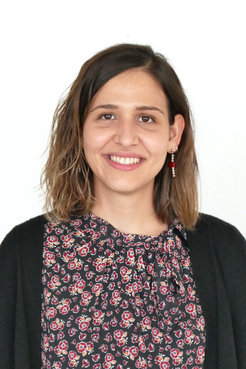Elisa Maggio receives award for her doctoral thesis
The postdoctoral researcher at the Max Planck Institute for Gravitational Physics will receive a prize from the Amaldi Research Center at La Sapienza University in Rome for her outstanding thesis on tests of general relativity. The honor, endowed with 3,000 euros, will be awarded to her on April 12, 2023, at the university in Rome.
In a black hole, its mass is concentrated within an extremely small volume; this is why black holes are among the most compact objects in the universe. In the close vicinity of a black hole, gravity becomes so strong that not even light can leave this region. The outer boundary of this region - the "event horizon" - is predicted by general relativity. No information or even matter from inside the black hole can cross the horizon.
Some modified theories of gravity predict the existence of compact objects without horizon. If the result of compact binary coalescence were such a horizonless object, this would affect the radiated gravitational-wave signal.
Testing Einstein's theory of relativity

"I am very pleased to receive this award and the recognition it brings to my research," says Dr. Elisa Maggio. "In my PhD thesis, I investigated the presence of horizons in black holes as predicted by general relativity. I derived the gravitational-wave signal that would be emitted if a horizonless compact object were formed during a compact binary coalescence. Since such objects are predicted by some modified theories of gravity, this allows us to test general relativity. If we were to measure the corresponding gravitational wave signal, we would have reached the limits of Einstein's theory."
According to the modified theories of gravity, the horizonless compact object formed during the merger would emit a characteristic signal - a gravitational-wave echo. In her thesis, Maggio derived a template that scientists can use to specifically search for such signals in the data from gravitational-wave detectors.
Elisa Maggio studied physics at La Sapienza University in Rome, Italy, where she received her PhD with a thesis entitled "Probing new physics on the horizon of black holes with gravitational waves" in 2022. Since November 2021, she has been a Leibniz Fellow in the Astrophysical and Cosmological Relativity Department of Prof. Alessandra Buonanno at the Max Planck Institute for Gravitational Physics (Albert Einstein Institute) in Potsdam. Maggio’s position is supported by the funds of the 2018 Gottfried Wilhelm Leibniz Prize of the Deutsche Forschungsgemeinschaft (DFG).
The Amaldi Research Center at La Sapienza University awards two prizes each year for the nation's best doctoral theses in astrophysical and cosmological sources of gravitational waves, multi-messenger astronomy, and quantum technologies and materials sciences for the development of third-generation gravitational-wave detectors (Einstein Telescope and Cosmic Explorer).












